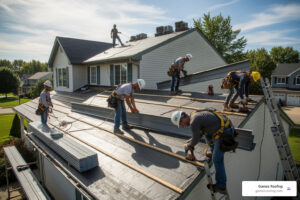Top Tips for Choosing a Contractor
Introduction
What makes the difference between a long-lasting TPO roof and one that fails within a few seasons? Knowing how to choose a reliable contractor for TPO roofing installation directly impacts your roof’s performance, energy efficiency, and warranty validity. This guide will enhance your selection process by exploring five critical tips—verifying specialized experience, confirming licensing and certifications, assessing reputation, understanding warranty options, and comparing transparent proposals—before closing with ten essential vetting questions. You’ll gain actionable insights to protect your property and partner confidently with an expert installer.
Why Is Choosing the Right TPO Roofing Contractor Crucial?
Installing a TPO roof with proper techniques boosts membrane integrity and delivers UV resistance, directly extending service life. Thermoplastic Polyolefin demands heat-welded seams and precise substrate preparation, so a contractor’s specialized skills play a pivotal role in achieving leak-free performance. Overlooking expertise can lead to premature membrane failure and voided manufacturer warranties, which in turn exposes your property to water damage and costly repairs.
What Makes TPO Roofing Installation Unique and Demanding?
TPO roofing installation requires heat-welding or fully adhered systems that fuse seams into a single monolithic sheet. This method creates a continuous barrier against moisture infiltration and UV degradation. For example, heat-welded seams must maintain consistent temperature and pressure to prevent pinholes, and substrate insulation needs careful alignment to support membrane expansion.
TPO Roofing Installation for Commercial Buildings (2024 Guide)
This guide outlines the steps involved in TPO roofing installation, including preparing the existing roof, adding insulation, and heat welding seams. It also mentions the benefits of self-adhered TPO roof membranes.
This source provides information on the installation process, which is relevant to the article’s discussion of contractor expertise.
Building on these technical requirements, the next section outlines specific risks that arise when expertise is missing.
What Risks Arise from Hiring an Unreliable TPO Contractor?
Even minor installation errors can compromise the entire system:
- Improper seam welding leads to pinholes and water penetration.
- Inadequate substrate preparation causes membrane wrinkles and blisters.
- Misaligned flashing and edge details encourage ponding water and corrosion.
Such failures not only increase maintenance costs but also nullify material and workmanship warranties, leaving you fully responsible for all repairs.
TPO Roofing Installation: What to Avoid
The article emphasizes the importance of proper TPO roofing installation techniques to prevent errors and ensure the roof’s longevity. It highlights the need to follow manufacturer instructions, prepare the substrate correctly, and perform testing to ensure the membrane is properly installed.
This source provides insights into the critical steps and potential pitfalls in TPO roofing installation, which is directly relevant to the article’s focus on selecting a reliable contractor.
How Do You Verify Experience and TPO Specialization in a Contractor?
Evaluating a contractor’s TPO specialization promotes confidence in their ability to manage membrane thickness, roll handling, and heat-weld procedures. You should seek installers with documented TPO project histories rather than general roofing portfolios to ensure familiarity with single-ply membrane nuances.
Why Is TPO-Specific Project History More Important Than General Roofing Experience?
General roofing experience may cover asphalt shingles or metal panels, but TPO membranes demand different adhesives, welding techniques, and inspection tools. A contractor with only shingle expertise might misjudge seam tension, increasing the risk of leaks. Prior TPO installations confirm hands-on knowledge of membrane handling and seam integrity.
Choosing a Top Rated TPO Roofing Specialist
The article emphasizes the importance of experience and certifications when selecting a TPO roofing specialist. It highlights that the best contractors have specialized knowledge, proper training, and certifications from respected industry organizations.
This source supports the article’s emphasis on the importance of experience and certifications when selecting a TPO roofing specialist.
What Questions Should You Ask About a Contractor’s TPO Installation Portfolio?
Before reviewing a portfolio, clarify expectations by asking:
- Which TPO manufacturers have you installed for?
- How many square feet of TPO membrane have you welded?
- Can you detail any challenging roof shapes you’ve addressed?
- What adhesion methods have you used on low-slope roofs?
- Do you provide photos and references for each past TPO project?
These questions reveal depth of practice and technical adaptability, setting the stage for trust in documented case studies.
How Can Case Studies and Past Projects Demonstrate Contractor Reliability?
Case studies showcase real-world problem-solving—such as retrofitting a complex roof geometry or repairing water-damaged insulation—illustrating the contractor’s attention to detail and adherence to TPO specifications. Reviewing before-and-after images, timelines, and client feedback confirms consistent quality and timely project completion.
What Licensing, Insurance, and Certifications Should a Reliable TPO Contractor Have?
A reliable TPO installer must hold appropriate licenses, maintain insurance, and carry manufacturer certifications to ensure legal compliance and financial protection. These credentials guarantee the installer meets local building codes and secures your property against liability during installation.
Which Licenses Are Essential for TPO Roofing Contractors?
Contractors should possess:
- State or municipal roofing contractor license.
- Specialty endorsement for commercial or single-ply roofing.
- Building permit authorizations where applicable.
Licenses verify official approval to perform commercial TPO work and align with local code requirements.
Why Is General Liability and Workers’ Compensation Insurance Necessary?
General liability insurance covers property damage and bodily injury claims that may occur on your site, while workers’ compensation ensures coverage for any on-the-job injuries. Together, these protections shield you from unforeseen financial responsibility in case of accidents or material damage during installation.
How Do Manufacturer Certifications Prove TPO Installation Expertise?
Certifications from leading TPO producers—such as Carlisle SynTec, Versico, or GAF—indicate that a contractor has completed specialized training and adheres to installation standards set by material experts. These credentials often qualify you for extended warranties and signal that the installer follows approved procedures for seam welding and membrane handling.
TPO Roofing Certification Classes for Professionals
The article discusses the importance of TPO roofing certification classes for contractors, builders, and roofing professionals. It highlights that these classes equip professionals with the necessary skills and knowledge for proper installation and maintenance of TPO roofing systems, which is often required by manufacturers for warranty compliance.
This source supports the article’s emphasis on the importance of certifications and specialized training for TPO roofing contractors.
How Can You Evaluate a Contractor’s Reputation and Customer Reviews?
Assessing reputation through online platforms and direct referrals provides social proof of consistent performance, customer service, and adherence to project timelines. Positive feedback on TPO installations, in particular, highlights a contractor’s ability to meet high standards for single-ply systems.
Where Should You Look for Reliable Online Reviews and Testimonials?
Begin with:
- Google Business Profile for verified client feedback.
- Yelp for detailed homeowner experiences.
- Better Business Bureau for complaint history and resolution records.
These platforms offer diverse perspectives on workmanship quality and customer satisfaction.
What Are Key Indicators of Positive Feedback Specific to TPO Roofing?
Look for reviews that mention:
- Seam integrity and leak-free performance.
- Professional handling of insulation and flashing details.
- Clear communication about timeline and budget.
Such comments confirm the contractor’s proficiency with TPO membranes and project management.
How Can References and Word-of-Mouth Strengthen Your Decision?
Contacting past clients directly allows you to ask about site conditions, adherence to schedules, and warranty follow-through. Personal referrals often reveal details that formal reviews overlook, such as responsiveness to minor adjustments and post-installation support.
What Warranty Options Should You Expect from a Reliable TPO Roofing Contractor?
Comprehensive warranty offerings protect your investment by covering material defects, workmanship errors, and potential unforeseen damages. Understanding differences in warranty types enables you to choose coverage that aligns with your risk tolerance and property goals.
What Are the Differences Between Material, Workmanship, and No Dollar Limit (NDL) Warranties?
Below is a comparison of typical warranty options:
| Warranty Type | Coverage Scope | Duration |
|---|---|---|
| Material Warranty | Defects in TPO membrane or accessories | 10–20 years |
| Workmanship Warranty | Installation errors, seam failures, flashing | 5–10 years |
| No Dollar Limit | Both material and labor costs without cap | 10–20 years |
TPO Roofing Warranties Explained: Coverage, Benefits, and More!
This article explains the different types of warranties available for TPO roofing, including material, workmanship, and No Dollar Limit (NDL) warranties. It also discusses what these warranties typically cover and what they exclude, which is crucial for understanding the protection offered by a reliable contractor.
This source provides information on warranty options, which is essential for evaluating the offerings of a TPO roofing contractor.
How Do Warranties Protect Your Investment in TPO Roofing?
Robust warranties ensure that any covered defect or installation flaw is remedied at no additional material or labor cost, preserving your budget and extending roof lifespan. They also demonstrate the contractor’s confidence in their workmanship and material selection.
What Questions Should You Ask to Confirm Warranty Validity?
To verify warranty authenticity, ask:
- Who issues each warranty—the manufacturer or contractor?
- What conditions void coverage (e.g., lack of maintenance)?
- How do I file a claim and what is the response timeframe?
- Are inspections required for renewal or transferability?
These inquiries confirm that you understand obligations and claim procedures.
How Do Transparent Pricing and Detailed Proposals Help You Choose the Best TPO Contractor?
Clear, itemized proposals promote trust by outlining every cost component, timeline milestone, and scope of work. This transparency reduces budget surprises and highlights the contractor’s organizational skills and commitment to open communication.
What Should a Comprehensive TPO Roofing Installation Proposal Include?
A thorough proposal specifies:
- Membrane brand, thickness, and square footage.
- Insulation type and cover board details.
- Labor hours, crew size, and equipment costs.
- Project schedule with start and completion dates.
- Waste disposal plan and site cleanup procedures.
Providing these line items ensures you compare proposals on an equal basis.
Why Is It Important to Get Multiple Itemized Quotes?
Collecting at least three detailed bids allows you to evaluate price variance against scope differences, identify low-ball offers missing critical components, and confirm market-competitive rates. This process improves budget control and highlights contractors who genuinely understand TPO requirements.
How Does Transparent Pricing Build Trust Between You and the Contractor?
When contractors break down costs and explain each element, they demonstrate respect for your investment and willingness to stand behind their work. Clear financial documentation fosters a collaborative relationship and sets expectations for project execution.
What Essential Questions Should You Ask Your Potential TPO Roofing Contractor?
Engaging with a contractor using targeted questions reveals their technical depth, project management approach, and commitment to service. The following list distills the most impactful inquiries for vetting a reliable TPO specialist.
What Are the Top 10 Questions to Vet a Reliable TPO Roofing Specialist?
- What is your total number of completed TPO installations?
- Which membrane manufacturers and thicknesses have you worked with?
- Can you provide three recent client references and project photos?
- What licenses and insurance policies cover this project?
- Do you hold any manufacturer certifications for TPO systems?
- How do you handle seam quality control and inspection?
- What warranty options will you offer and who backs them?
- How will you protect existing structures and landscaping?
- Can you walk me through your safety and quality assurance protocols?
- How do you manage unexpected issues or scope changes during installation?
How Can These Questions Help You Avoid Common Contractor Pitfalls?
By addressing experience, credentials, warranties, and risk management upfront, these questions filter out underqualified bidders and clarify expectations for communication, quality, and accountability. Clear answers signal a contractor’s readiness to deliver a leak-proof, energy-efficient TPO roof.
A dependable TPO installer transforms your roofing investment into lasting value. Partner confidently by applying these five key tips and ten vetting questions, and secure the expertise that your property deserves.




